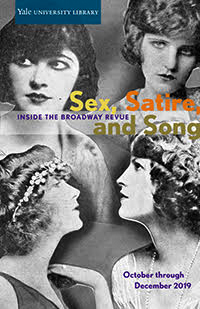
Courtesy of Irving S. Gilmore Music Library
Before “Hamilton,” there was “The Band Wagon.”
“The Band Wagon,” which is a revue, brings together a series of short sketches, songs and dances with a common theme. The Irving S. Gilmore Music Library launched a new exhibit titled “Sex, Satire and Song: Inside the Broadway Revue” to shed light on the birth, evolution and demise of revues of Broadway on Sept. 26.
Curated by performer and scholar Ben West, the exhibit features papers, playbills and excerpts from the Yale archives. Characterized by pastiche, wit and relevance, revues are known to be plotless but provocative. From the end of the 19th century to the mid-20th century, revues functioned as a place for young performers and directors to innovate. Many of the stars who cut their teeth writing for revues later wrote hits for major book musicals. For example, Harold Arlen and E.Y. Harburg, the team behind “Over the Rainbow” from “The Wizard of Oz,” both started their careers writing for revue.
The exhibit contains materials from different moments in the history of the genre. Musical scores are juxtaposed with production posters from World War II. A TV screen cycles through a selection of quotes from revue artists, such as Broadway impresario Florenz Ziegfeld.
Archivist Richard Boursy MUS ’94 said that the process of putting together the show began last year, but became serious this spring.
The exhibit draws attention to West’s unique position as both a curator and performer. The exhibit features five recordings of Broadway revue songs, two of which are performed by West himself. West recorded Cole Porter’s 1922 “The American Punch” and Harold Rome’s 1942 “She Did It for Defense” in studio. The arrangements — featuring pianist Dan Pardo, bassist Will Hack and percussionist Sam Lazarra — have been updated for a contemporary ear.
The exhibit also bears witness to the revue’s decline. As musicals became more popular, the genre’s progenitor was driven out of the market.
Still, in an interview with the News, West said that no genre of performance has become an incubator for unknown creatives like the revue.
“Young writers had to find other outlets to test out their work,” West said. “And perhaps that is what helped foster and launch the myriad of smaller downtown or Off-Broadway institutions.”
But for a brief time, the revue lives on in the hallway outside of the music library. Passersby can marvel at the artifacts and listen to the songs.
The digital version of the exhibit will include an NBC Broadcast recording of the 1943 revue, “Stars and Gripes,” as well as the full text of the essay “Lunchtime Follies” by Kurt Weill.
“The library has amazing stuff and a vast quantity of it,” Boursey said. “We want to bring it to people.”
The exhibit will remain on display through December.
Esther Reichek | esther.reichek@yale.edu







